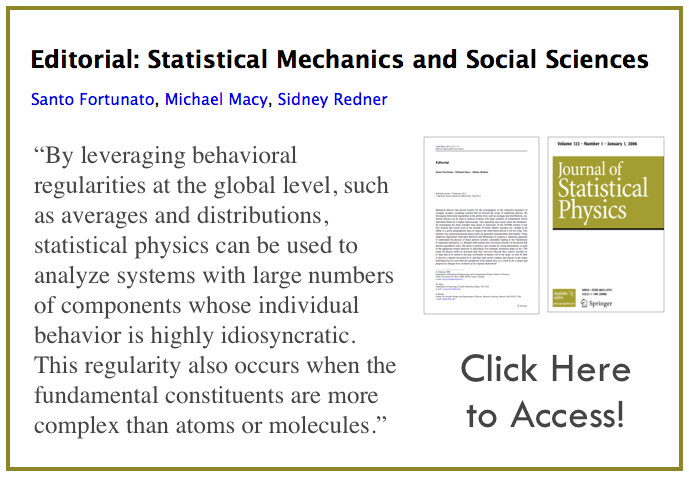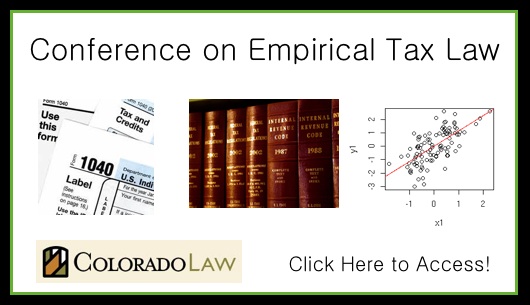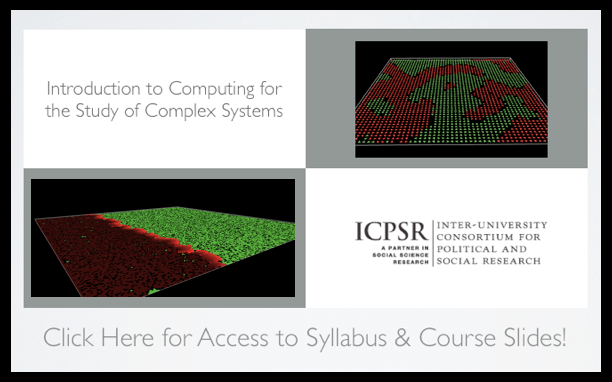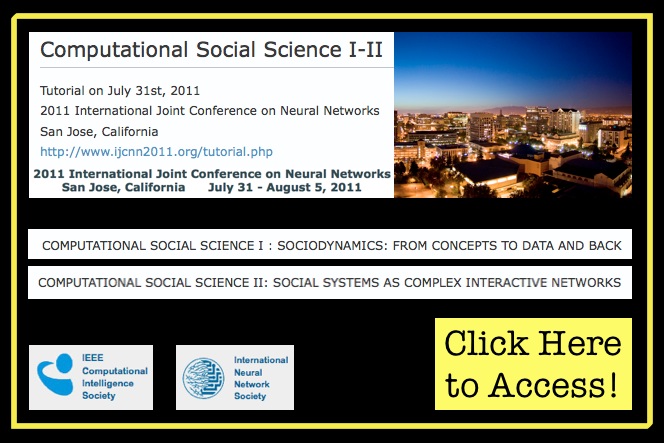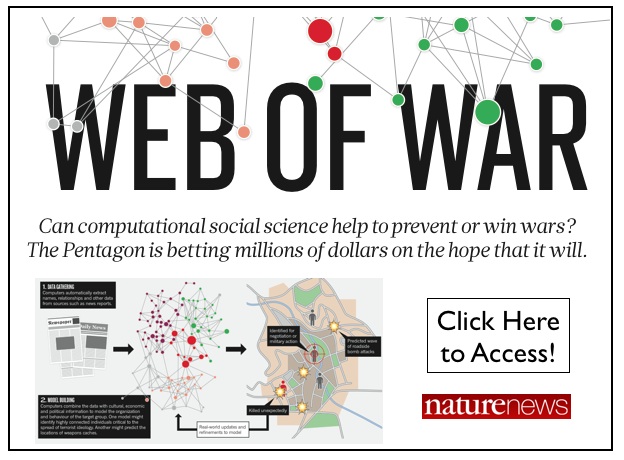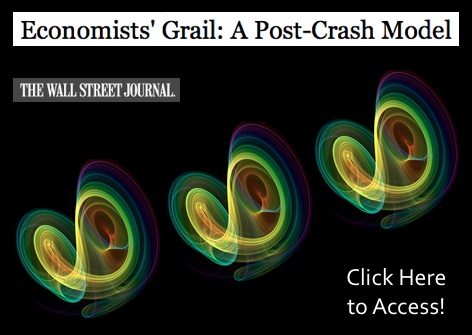Tag: computational social science
Machine Learning for Hackers – Published By O’Reilly Media [Drew Conway & John Miles White]
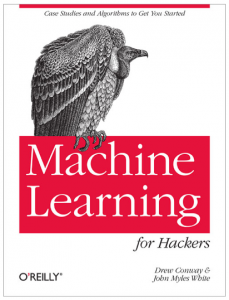 Below is the Table of Contents for the new book “Machine Learning for Hackers” by Drew Conway & John Miles White. Drew is a long time friend of this blog and we are very excited about his new book. My copy just arrived and I will be working through the book this summer (for potential inclusion in the 2013 edition of my Quantitative Methods for Lawyers Course and/or E-Discovery Course).
Below is the Table of Contents for the new book “Machine Learning for Hackers” by Drew Conway & John Miles White. Drew is a long time friend of this blog and we are very excited about his new book. My copy just arrived and I will be working through the book this summer (for potential inclusion in the 2013 edition of my Quantitative Methods for Lawyers Course and/or E-Discovery Course).
Here is the description: “Each chapter focuses on a specific problem in machine learning, such as classification, prediction, optimization, and recommendation. Using the R programming language, you’ll learn how to analyze sample datasets and write simple machine learning algorithms. Machine Learning for Hackers is ideal for programmers from any background, including business, government, and academic research.” Check it out!
TOC ML4Hackers
Introduction to Computing for Complex Systems – Slides and Other Course Materials from ICPSR 2011
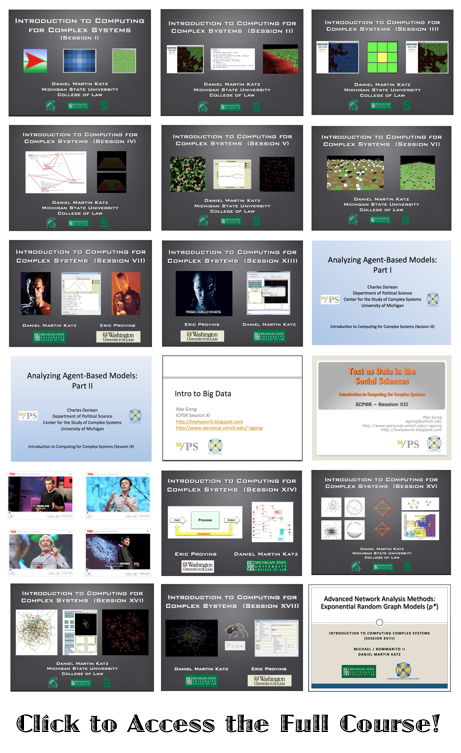 I am going to bump this post to front of the blog one last time as there has been some interest in this material. It has now been several weeks since we completed the full four week class here at the ICPSR Program in Quantitative Methods. In this course, I (together with my colleagues) highlight the methods of complex systems as well as several environments designed to explore the field. These include Netlogo (agent based models and network models), Nova (system dynamics / ecological modeling) and Pajek (empirical network analysis). In addition, we a variety of advanced topics including:
I am going to bump this post to front of the blog one last time as there has been some interest in this material. It has now been several weeks since we completed the full four week class here at the ICPSR Program in Quantitative Methods. In this course, I (together with my colleagues) highlight the methods of complex systems as well as several environments designed to explore the field. These include Netlogo (agent based models and network models), Nova (system dynamics / ecological modeling) and Pajek (empirical network analysis). In addition, we a variety of advanced topics including:
- (a) Community Detection in Networks
- (b) Computational Linguistics / Natural Language Processing
- (c) Diffusion Models and Mathematical Modeling with Data
- (d) Exponential Random Graph (p*) Models
- (e) Big Data/ Information Retrieval / Webscraping
Although, we do not work with more advanced languages within the course, those who need to conduct complex analysis are directed to alternatives such as R, Python, Java, etc.
Anyway, the slides are designed to be fully self-contained and thus allow for individually paced study of the relevant material. If you work through the slides carefully you should be able to learn the software as well as many of the core principles associated with the science of complex systems. The material should be available online indefinitely. If you have questions, feel free to email me.
Data Without Borders – Jake Porway & Drew Conway
Friend of the CLS Blog Drew Conway has started a fantastic organization called Data Without Borders. DWB seeks to match non-profits in need of data analysis with freelance and pro bono data scientists who can work to help them with data collection, analysis, visualization, or decision support. Check out the video to learn more!
ICPSR Course – Introduction to Computing for the Study of Complex Systems [ The 2011 Edition ]
Some new content for the 2011 Edition of the course including Cloud Based Computational Social Science, Exponential Random Graph Models (p*), System Dynamics, the new Nova Platform and more … stay tuned!
Introduction to Computing for Complex Systems – Slides and Other Course Materials from ICPSR 2010
I decided to bump this post to front of the blog as I am getting ready to dust off this material in anticipation of the 2011 ICPSR Course in Complex Systems Models in the Social Sciences. The course will be offered as part of Session #2 of the ICPSR Program in Quantitative Methods. It has two components (1) morning lectures on complex systems theory and (2) a late afternoon session on complex systems / computational model implementation.
Unlike many courses that relegate model/data implementation to self-teaching, etc. in the ICPSR Summer Course in Complex Systems, we take implementation seriously. Indeed, I believe our emphasis on implementation is a distinguishing feature of the course. In my experience, implementation mechanics are typically the impediment that many scholars face in generating models capable of being published in academic journals. Implementation is the bridge between concept and scientific contribution.
In the computing module, I (together with my colleagues) highlight the methods of complex systems as well as several environments designed to explore this rich and growing intellectual field. These include Netlogo (agent based models and network models), Vensim (system dynamics / ecological modeling) and Pajek (empirical network analysis). In the final week, we cover a variety of advanced topics:
- (a) Community Detection in Networks
- (b) Computational Linguistics / Natural Language Processing
- (c) Diffusion Models and Mathematical Modeling with Data
- (d) Exponential Random Graph (p*) Models
- (e) Information Retrieval / Webscraping
Although, we do not work with more advanced languages within the course, those who need to conduct complex analysis are directed to alternatives such as R, Python, Java, etc.
Anyway, the slides were designed to be fully self-contained and thus allow for individually paced study of the relevant material. If you work through the slides carefully you should be able to learn the software as well as many of the core principles associated with the science of complex systems. Although the 2010 course material should be available indefinitely, I do plan to add some new material for the 2011 session. In particular, we plan to highlight Nova — a new software package developed in the Oberlin Computer Science Department by Richard Salter. Stay tuned for more in July / August 2011 ….
Computational Social Science Tutorial @ 2011 International Joint Conference on Neural Networks
Those of you interested in developing/increasing your computational social science skills should consider attending the 2011 International Joint Conference on Neural Networks where Peter Erdi (Kalamazoo College & Hungarian Academy of Sciences) will be administrating the very useful workshop displayed above. I have learned a tremendous amount from Peter Erdi and would thus recommend the workshop to you.
The Future of Computational Social Science @ University of Washington – Submissions Due Jan. 30, 2011
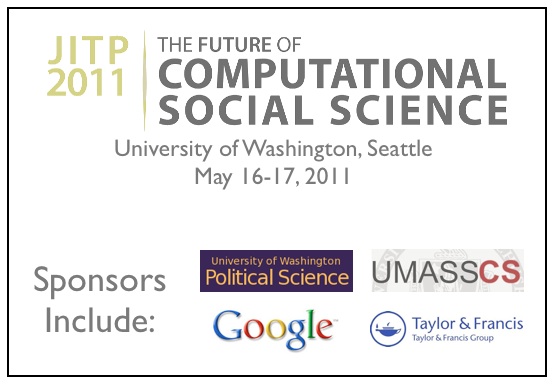 As a member of the conference program committee, I would like encourage you to consider submitting a paper to “The Future of Computational Social Science” at the University of Washington – Seattle, May 16-17, 2011. The conference aims to bring together leaders from industry and the academy to present cutting edge work. For those who might be interested in attending, please click on the image above or here to access the call for papers. Here is an excerpt:
As a member of the conference program committee, I would like encourage you to consider submitting a paper to “The Future of Computational Social Science” at the University of Washington – Seattle, May 16-17, 2011. The conference aims to bring together leaders from industry and the academy to present cutting edge work. For those who might be interested in attending, please click on the image above or here to access the call for papers. Here is an excerpt:
“Computational social science is an emergent field and source of new theoretical and methodological innovation for social science more broadly. Multidisciplinary teams of social and computer scientists are increasingly common in the lab and at workshops where cross-fertilization occurs in the areas of theory, data, methods, and tools. Peer-reviewed interdisciplinary work is becoming more common as the computational tools and techniques of computer science are being used by social scientists. Previously, large-scale computational processing was the purview of expensive, university-centric computing labs. Now, with the democratization of technology, universities and for-profit firms increasingly provide large amounts of inexpensive computing power to researchers and citizens alike.”
Authors are invited to prepare and submit to JITP a research paper, policy viewpoint, workbench note, or teaching innovation manuscript by January 30, 2011. There is also an option to submit an abstract for potential inclusion in the poster session. The poster abstract is also due January 30, 2011.
Humanities in the Digital Age [Via MIT World]
About the Lecture: “Reports of the demise of the humanities are exaggerated, suggest these panelists, but there may be reason to fear its loss of relevance. Three scholars whose work touches a variety of disciplines and with wide knowledge of the worlds of academia and publishing ponder the meaning and mission of the humanities in the digital age. Getting a handle on the term itself proves somewhat elusive. Alison Byerly invokes those fields involved with “pondering the deep questions of humanity,” such as languages, the arts, literature, philosophy and religion. Steven Pinker boils it down to “the study of the products of the human mind.” Moderator David Thorburn wonders if the humanities are those endeavors that rely on interpretive rather than empirical research, but both panelists vigorously make the case that the liberal arts offer increasing opportunities for data-based analysis.
Technology is opening up new avenues for humanities scholars. In general, Byerly notes, humanities “tend to privilege individual texts or products of the human mind, rather than collective wisdom or data.” More recently, online collections or data bases of text, art and music make possible wholly different frameworks for study.
Humanists are adopting new tools and methods for teaching and publishing as well. As Pinker notes, the process for publishing articles in scholarly journals remains painfully slow: in experimental psychology, a “six year lag from having an idea to seeing it in print.” He suggests a “second look” at the process of peer review, perhaps publishing everything online, “and stuff that’s crummy sinks to the bottom as no one links to or reads it.” Pinker looks forward to a future where he no longer has to spend a “lot of time leafing through thick books” looking for text strings, or flipping to and from footnotes. “We could love books as much as we always have, but not necessarily confine ourselves to their limitations, which are just historical artifacts,” he says.”

